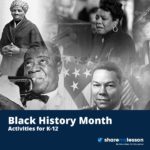This is the first of three revisits to the Declaration of Independence; three communities to which the tenets of life, liberty, and the pursuit of happiness did not apply. Byron Williams, author of The Radical Declaration, walks us through how enslaved Americans and Black Americans pushed against the document from the very beginning of our nation’s founding.
This short episode includes a one-page Graphic Organizer for students to take notes on while listening, as well as discussion questions on the back side.
Competing Voices of the Civil Rights Movement
When most people think of the Civil Rights Movement in America, they think of Martin Luther King, Jr. delivering his “I Have a Dream” speech on the steps of the Lincoln Memorial in 1963 and receiving the Nobel Peace Prize the following year. But “the Movement” achieved its greatest results — the 1964 Civil Rights Act and the 1965 Voting Rights Act — due to the competing strategies and agendas of diverse individuals. Even black Americans, the primary beneficiaries of this landmark legislation, did not agree on the tactics that should be used to secure the equal protection of their rights. This unit presents the views of several important black leaders who shaped the debate over how to achieve freedom and equality in a nation that had long denied a portion of the American citizenry the full protection of their rights.
Learn About Black History, Culture and Politics
Learn about Black history in the United States before and after the Civil War; the Civil Rights Movement; the history of Africa; African American art; and African American trailblazers.
The Talented Tenth, W.E.B. DuBois
District of Columbia Compensated Emancipation Act of 1862
The 150th anniversary of the District of Columbia Compensated Emancipation Act of 1862
occurred in 2012. This bill was introduced to Congress to end slavery in the District of
Columbia. Many citizens and members of Congress alike noted that the legality of slavery in
the District of Columbia was inconsistent with the ideals and aspirations of the nation. Congress
approved the bill, and President Abraham Lincoln signed the act.
This activity features the District of Columbia Compensated Emancipation Act of 1862 and
other primary and secondary sources that tell the story of Congress’s role in this first major step
toward the freeing of enslaved African Americans. While intended for 8th grade students, the
lesson can be adapted for other grade levels.
Jim Crow Wisdom: Memory and Identity in Black America Since 1940
James Basker & Johnathan Holloway discuss the novel written by Mr. Holloway, Jim Crow Wisdom: Memory & Identity in Black America Since 1940.
Black History Month Lesson Plans & Resources

This February, start your Black History Month lesson planning with Share My Lesson’s expanded collection. The Share My Lesson team has curated a collection of free lessons, worksheets, and activities for educators to use to teach preK-12 students about key events and individuals whose accomplishments continue to influence us today.
Black History Month Lesson Plans on Nonviolence
The power of nonviolent actions and attitudes as a means to resist oppression and spur reforms is a recurring feature of democratic and democratizing societies. The School Violence Prevention Demonstration Program presents educators with lesson plans that explore the use of nonviolence in history, paying particular attention to the civil rights movement and African American history. Six lessons address: the 1963 Children’s March; the concept of nonviolence using primary sources and stories of participants in the civil rights movement; the power of nonviolence; the story of Rosa Parks; citizenship schools; how music can be used to achieve social and political change.
Patriotism Crosses the Color Line: African Americans in World War II
Professor Clarence Taylor reminds us of the role African American soldiers played in the conflict—and the role their military service played in shaping the racial politics that followed in peacetime. This essay helps us appreciate the complexity of mobilization for modern warfare and drive home the impact of events on the world stage upon domestic affairs. Free registration for students and teachers required to access resource.
Martin Luther King, Jr. and Nonviolent Resistance

By examining King’s famous “Letter from a Birmingham Jail” in defense of nonviolent protest, along with two significant criticisms of his direct action campaign, this lesson will help students assess various alternatives for securing civil rights for black Americans in a self-governing society. (Duration: 3 class periods)
